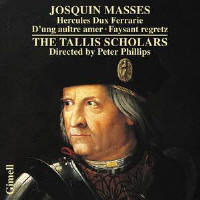Texte paru dans: / Appeared in: |
|
|
Outil de traduction ~ (Très approximatif) |
|
|
Reviewer: J.
F. Weber
With this ninth and final
release, the Tallis Scholars have issued on their own label all 18 Masses of
Josquin des Prez, along with the Missa Da pacem correctly credited to Noel
Bauldeweyn (Fanfare 43:3). (The old complete works included a 20th Mass,
Missa Allez regretz, spurious and never yet recorded.) At least two other
ensembles undertook a similar project to record the complete Masses before
the quincentenary of the composer’s death. Note that Peter Phillips saved
for the end the Missa Hercules Dux Ferrariae, only the second of the Masses
to be recorded complete after Missa Pange lingua, also the most recorded of
the Masses after that same masterpiece. Missa Faysant regretz has enjoyed
two fine recordings under Peter and Timothy Davies (8:6; later on CD) and
Edward Wickham (25:6); two others on Cybelia (14:5) and Pavane are
dispensable. Missa D’ung aultre amer has also enjoyed two fine recordings
under David Skinner (33:1) and Tetsuro Hanai (41:5). That work is unusual in
that Josquin replaced the Benedictus with the prima pars of his motet Tu
solis qui facis mirabilia, all early sources transmitting the Mass this way.
Phillips, however, presents the entire motet, not just part. The full motet
appeared only in Petrucci’s 1503 volume of motets.
The main work deserves close
comparison. Recordings of Missa Hercules Dux Ferrariae began with Guillaume
de Van, who gave us just the Kyrie on Anthologie Sonore in 1938, when fewer
than a dozen Josquin works had ever been recorded. Half a dozen forgettable
complete recordings appeared, then James Wood (10:5), the Hilliard Ensemble
(14:1), and Alexander Blachly (27:6) followed with excellent
interpretations. Walter Testolin (33:5), Hanai (41:6), and Maurice Bourbon
(37:6) are the most recent. The latest scholarly understanding, confirmed by
David Fallows in his masterly Josquin (Brepols, 2009), puts the composition
of this Mass in 1504, commissioned by Alfonso (the son and soon-to-be
successor of Ercole I as duke of Ferrara) as an homage to his father.
Indeed, Testolin and Bourbon fill out their discs with music of the Ferrara
year, when Josquin took up residence at the court.
Phillips considers that the
three Masses belong to the same period of Josquin’s life, for he calls Missa
D’ung aultre amer “probably slightly earlier than the other two.” Fallows
sees similarities in the Hercules and Faisant settings, placing composition
of the latter right after the former. He calls Missa Faisant regretz “the
shortest of his unquestioned Masses.” But consistent with his narrow view of
authenticity among works generally attributed to Josquin, he has serious
doubts about Missa D’ung aultre amer, which he would date to the 1480s in
any case, one of the earliest Masses. In Phillips’s latest approach, the disc provides 47 tracks for access to every section of each work. The cover bears the Dosso Dossi portrait of Ercole I that graced Tetsuro Hanai’s recording of the same Mass. While several recordings of the Mass for Ercole I are very fine (Hilliard, Blachly, Testolin, Hanai), this disc will be a required purchase for collectors of the complete Masses. Peter Phillips need not rest on his laurels now. I hope he assembles a group of Josquin’s motets that carries a theme through the disc. There is nothing like it on records yet.
| |
|
|
|
|
Cliquez l'un ou l'autre
bouton pour découvrir bien d'autres critiques de CD |
|




